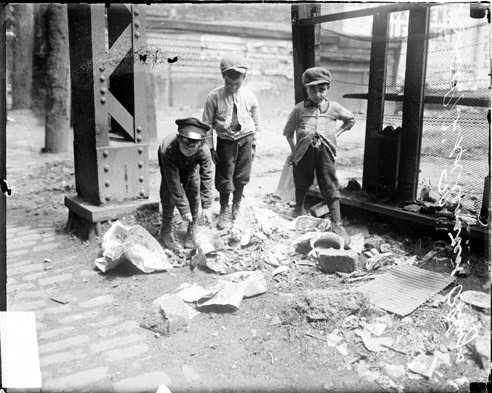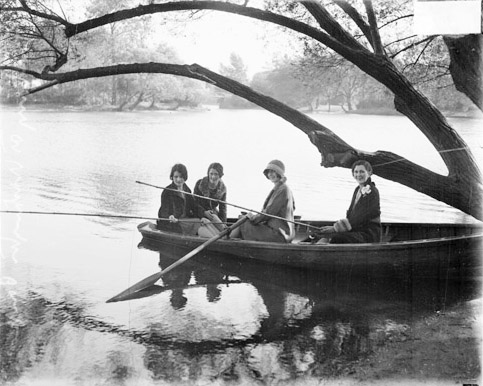Young Lonigan
"...The story of Studs Lonigan opens on the day in June when he graduates from Saint Patrick’s grammar school on the South Side of Chicago. It is the same day on which Woodrow Wilson was re-nominated as presidential candidate by the Democratic National Convention in St. Louis. There was, in my mind, a general parallelism in these two events; one historic, the other fictional; one an event of importance in the history of a nation, the other of significance in the life of a boy in fiction..."James Farrell - Young Lonigan Preface

About James FarrellWriting and Style
Farrell's writing combines Naturalistic styles with boyhood freedom. His writing is the transcription of young Lonigan's thoughts and dreams. Studs grows up in an Irish Catholic neighborhood in South Side Chicago during the 1920's. His father is hard-working and provides for the family, enabling Studs to somewhat control his fate and destiny. However, Farrell makes a point of how outside forces affect Studs' actions-how controls of society like church, girls, home, and school are exerted on the boy. During his adolescence, Studs experiences the evolution of his neighborhood as well as himself. Farrell humorously portrays this maturity but also alludes to the impact of surrounding forces. As Farrell acknowledges in his introduction, the story of Studs Lonigan is insignificant in comparison to other events in history, however, in its depiction of how one child's development can reflect the power of the surrounding environment, the story of Young Lonigan is universally important.

Outside Forces and Internal Thoughts
In his mind, Studs Lonigan believes he is a heavyweight fighter, a respected and feared competitor, and a neighborhood hero. In reality, he dreams adolescent boy dreams and he looks at his changing physique in the mirror. He thinks about Lucy and other girls and wonders what his feelings truly mean. The mind of Studs Lonigan is constantly buzzing and conflicts with the outside forces that help determine his character. His parochial school is the most conforming to his personality. Deeply imbedded in Studs' conscience is a belief in good and evil, morals, and especially sin. These religious concepts affect his understanding of his own maturation. In one scene, Studs experiences a sort of sexual awakening while talking to his sister Fran-
"You know. Do you think they did anything that was fun...or that the sisters wouldn't want them to do...or that's bad?" "I don't know." Dirty thoughts rushed to his head like hot blood. He told himself he was a bastard because...she was his sister...She got up, and walked nervously around the room. She plunked down on the piano stool, and part of her leg showed. He looked out the window. He looked back. They sat. She fidgeted and couldn't sit still. She got up and ran out of the room. He sat there. He must be a bastard...she was his sister...He heard the wind, and was afraid that God might punish him, make him die in the night. He had found out he was old enough, but...his soul was black with sin. He lay in bed, worried, suffering, and he tossed into a slow, troubled sleep.Young Lonigan pp. 62-63
In this brief scene, we witness how powerful religion can be to Studs, let alone in the mind of any kid. As he talks to his sister about sexual things, he feels an overwhelming curiosity and guilt. He is unable to differentiate between the female roles in his life. He thinks about Lucy but Fran also easily enters his mind. When he lays in bed, he actually believes God will kill him in his sleep.
Studs continues to mature; he beats people up and makes a name for himself and he eventually abandons his affection for Lucy, deciding that he is too gritty and rough for a good girl like her. Characters like Weary and Iris help mold Studs' persona. School and family, which were once so prominent in Studs' development, have been put aside as he becomes a man of the streets. Ethnic conflict is a constant theme. Studs talks about beating up Kikes, other characters insult the Irish community, and all the while, Blacks begin to file into the neighborhood. These communal divisions that are so hostile throughout the book have as much as an effect on Studs as other outside forces. He is the result of his society and partially his own dreams.